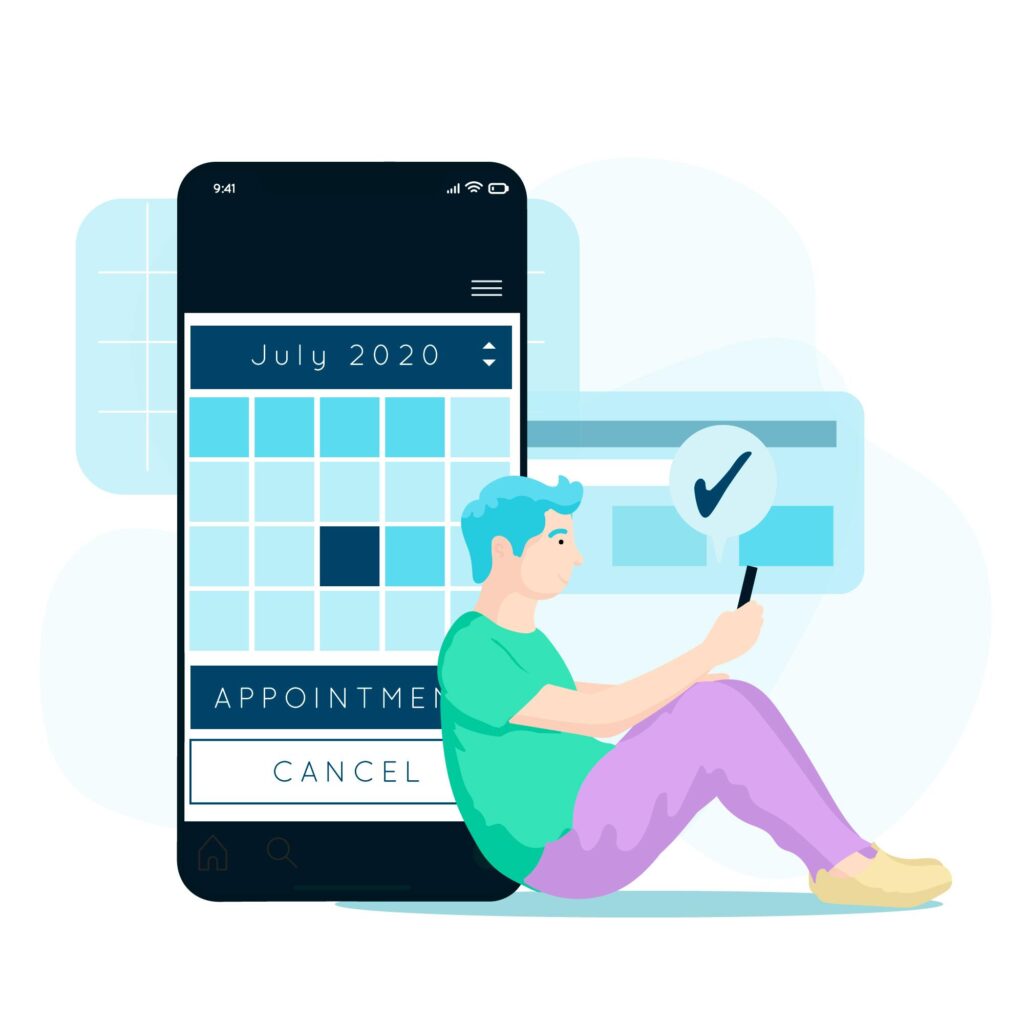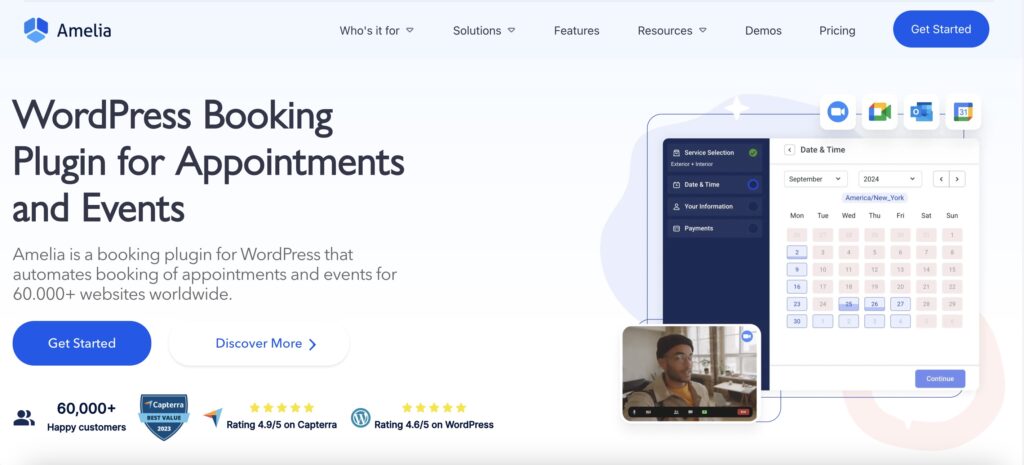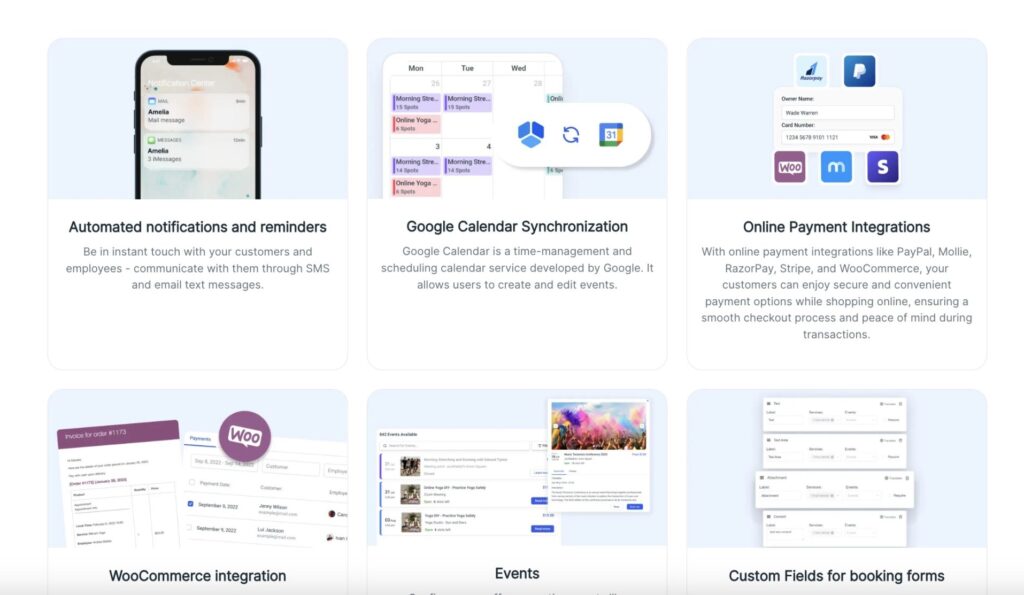Have you ever found yourself needing to cancel an appointment at the last minute? Maybe plans changed, or something unexpected came up. The question then becomes: How to cancel an appointment politely and professionally?
Whether it’s a sudden change in plans or an unexpected conflict, canceling appointments can sometimes feel like walking a tightrope.
How can you make sure both your business and your clients feel respected in tricky cancellation situations? Let’s delve into the art of knowing how to cancel an appointment with ease and consideration for everyone involved.
But first, let’s take a look at the most common (and totally valid) reasons for canceling an appointment.
What Are the Most Common Reasons for Canceling an Appointment
Let’s imagine a scenario where you, as a service business owner, find yourself in need of canceling an appointment.
You wake up on a Monday morning, ready to tackle the week ahead. Your schedule is packed with client meetings and deadlines. As you sip your morning coffee, you receive an email notification reminding you of an upcoming appointment with a new client. However, as the day unfolds, you encounter a series of unexpected challenges that compel you to consider canceling the appointment.
Here are the four possible reasons for canceling an appointment:
Unforeseen circumstances
Despite our best-laid plans, unforeseen events can disrupt even the most meticulously organized schedules. Consider this scenario: While you’re preparing for the meeting, you receive an urgent phone call from your child’s school. Your child has fallen ill and needs to be picked up immediately. Despite your best intentions, you realize that you cannot leave your sick child unattended, prompting you to cancel the appointment.
Conflicting schedules
Navigating conflicting schedules is an everyday challenge, especially in the service business industry. As you review your calendar, you realize that the appointment coincides with a critical team meeting to discuss an ongoing project. With your team’s collaboration essential for project success, you decide to reschedule the client meeting to ensure everyone’s availability.
Pro tip: An online booking system is a great way to stay organized and avoid appointment scheduling mistakes, double bookings, and scheduling conflicts. With a booking solution, you can easily keep track of your appointments and have full control over your schedule thanks to centralized scheduling, real-time availability updates, calendar syncs, and appointment reminders.
Avoid Conflicting Schedules and Double Bookings with Amelia
Conflicting schedules and double bookings can be a nightmare for service business owners, but with the Amelia booking plugin, these worries become a thing of the past.
This powerful booking tool offers a comprehensive solution for appointment scheduling, cancellations, and other booking needs, making your life as a service business owner much easier.
Let’s see how!
How can Amelia help you?
- The intuitive interface allows you to manage appointments seamlessly, ensuring that your schedule remains organized and up-to-date at all times.
- The real-time availability feature provides real-time visibility into your schedule, ensuring that appointments are booked only during available time slots. Dynamically adjusting availability based on existing appointments prevents double bookings and eliminates the risk of overlapping schedules.
- With Amelia’s customizable booking rules, you’re in control of your booking rules. You can define specific rules and restrictions for appointment scheduling, such as maximum bookings per time slot or minimum notice required for new appointments. These customizable rules help prevent scheduling conflicts and ensure that your calendar remains organized and manageable.
- With Amelia’s customizable options and ease of use, clients can easily book and manage appointments online, which enhances the overall booking experience for your clients.
- Amelia seamlessly integrates with external calendars such as Google Calendar, ensuring consistency across all scheduling platforms. Any appointments booked through Amelia are automatically synced with your external calendar, reducing the risk of double bookings and providing a centralized view of your schedule.
With these features and more, the Amelia booking plugin empowers you to manage your schedule with confidence, eliminating the stress of conflicting schedules and double bookings.
Ready to take your appointment management to the next level?
Take Amelia for a spin and see how it can revolutionize your business!
Sudden illness
Midway through the day, you begin to feel unwell, experiencing symptoms of a sudden migraine. Recognizing the importance of being fully present and attentive during client interactions, you opt to cancel the appointment to prioritize your health and well-being.
Change in priorities
Just as you are about to leave for the meeting, you receive an urgent request from a long-standing client for immediate revisions to a crucial project. Understanding the significance of maintaining client satisfaction and meeting project deadlines, you choose to focus on the urgent task at hand. The result? You need to cancel the appointment.
How to Cancel an Appointment in 5 Steps
No matter which of the scenarios we’ve discussed applies to your situation, the objective remains the same: to learn how to cancel an appointment politely to ensure your client’s understanding and satisfaction.
So, let’s take a look at the steps necessary to handle the situation smoothly and professionally.
1. Review your appointment cancellation policy
As a service business owner, the first step is to review your business’s appointment cancellation policy. This policy should outline the procedures and any associated fees or penalties for canceling appointments. While this policy primarily protects you from revenue loss due to last-minute client cancellations, you need to keep things fair.
This means that you should extend the same rules to both your clients and your business. In other words, if your business cancels an appointment with short notice, offering to compensate the client with a fee ensures fairness. So, make sure to familiarize yourself with the terms of your cancellation policy to ensure you adhere to them while canceling the appointment.
2. Notify the client as soon as possible
Prompt communication is crucial when canceling an appointment. Reach out to the client as soon as you become aware of the need to cancel. Consider the following methods:
Direct communication (phone call or email)
Personally contact the client via phone call or send them an appointment cancellation email to inform them of the cancellation. Start by expressing your regret for the cancellation and apologize for any inconvenience caused. Provide a brief explanation for the cancellation, such as unforeseen circumstances or scheduling conflicts. Let them know you value their business and offer them the possibility to reschedule.
Online booking platforms or apps
If you use an online booking system or scheduling app, make use of its messaging feature to notify the client of the cancellation. Craft a clear and concise message that includes the reason for the cancellation, if appropriate, and instructions on how to reschedule. Also, send the message as soon as possible, to minimize any disruption to the client’s plans.
3. Provide a reason for canceling the appointment (if necessary)
It’s not always necessary, but it’s helpful to provide a brief explanation when canceling an appointment. This can maintain transparency and understanding between you and the client. You should be honest about why you need to cancel, whether it’s due to unexpected circumstances, personal commitments, or unforeseen emergencies. Make sure to keep the explanation professional and concise, and focus on how the cancellation impacts the client’s appointment.
4. Offer to reschedule
If possible, offer to reschedule the appointment at a time that works for both you and the client. This shows that you value their needs and are committed to accommodating them. When suggesting alternative appointment options, take into account the client’s availability and preferences. Be flexible and proactive in finding a suitable solution, and emphasize your willingness to prioritize their appointment and provide exceptional service.
5. Follow-up to ensure appointment cancellation is confirmed
Once you have informed the client about the cancellation, it is crucial to follow up to ensure that they have received the message and fully understand the situation. Taking this additional step helps prevent any misunderstandings and shows the client you are trying to minimize the disruptions caused by appointment cancellation. You can send a follow-up email or message to apologize for any inconvenience caused and offer any further assistance or information that the client may require. By being proactive in confirming the appointment cancellation, you can ensure that both you and the client are on the same page and minimize the chances of any miscommunication.
Bonus Tips on How to Cancel an Appointment Politely and Professionally

Knowing how to cancel an appointment politely requires finesse and tact to ensure that all parties involved feel respected and valued. Here are five tips to keep in mind:
1. Be honest and transparent
Honesty is the best policy when it comes to canceling an appointment. Provide a genuine reason for the cancellation, whether it’s due to unforeseen circumstances, scheduling conflicts, or personal emergencies. Transparency builds trust and understanding between you and the client.
2. Apologize sincerely
Express sincere apologies for any inconvenience caused by the cancellation. Acknowledge the impact of your decision on the other person’s schedule and demonstrate empathy for their situation.
3. Give ample notice
Whenever possible, give your client sufficient notice of the cancellation. Aim to notify them as soon as you become aware of the need to cancel, allowing them time to adjust their plans accordingly.
4. Reschedule, if possible
Offer to reschedule the appointment at a mutually convenient time. This demonstrates your commitment to maintaining the relationship and ensures that your client’s needs are still met.
5. Express gratitude
Thank your client for their understanding and cooperation, as well as for the opportunity to schedule the appointment initially. Thank them for their understanding and cooperation, and reaffirm your appreciation for their interest in your services or involvement in the appointment. Gratitude goes a long way in building a loyal clientele.
What to Avoid When Canceling an Appointment
When canceling an appointment, you should never:
- Cancel at the last minute: Avoid canceling appointments at the last minute whenever possible. Doing so can cause inconvenience for your clients and may damage your professional reputation.
- Provide false excuses: Avoid providing false excuses or exaggerating the reasons for the cancellation. Dishonesty undermines trust and may lead to further complications in the future.
- Ignore communication: Don’t ignore communication from the other party or delay notifying them of the cancellation. Prompt and open communication is essential to minimizing the impact of the cancellation and maintaining good relationships with your clients.
- Be abrupt or rude: Maintain a polite and courteous tone in all communication regarding the cancellation. Avoid being abrupt or dismissive, and instead, approach the situation with kindness and professionalism.
- Forget to follow up: Don’t forget to follow up with your client to confirm the cancellation and ensure that they have received the message. Following up demonstrates your commitment to clear communication and helps prevent misunderstandings.
Takeaway
While canceling appointments may be unavoidable at times, how you handle the situation speaks volumes about your professionalism and integrity. By following the tips and strategies outlined in this guide on how to cancel an appointment politely, you can navigate cancellations with grace and ensure that both you and your clients are treated with respect and consideration.
When you need to cancel an appointment, it’s important to apologize for any trouble it may cause. Always try to give plenty of notice, and offer to reschedule the appointment to suit the other person. It’s also important to thank them for their understanding and cooperation. This helps to keep things positive and make a good impression.
So, the next time you find yourself needing to cancel an appointment, remember the importance of approaching the situation politely and considerately. By doing so, you’ll uphold the standards of excellence in your business interactions and maintain the trust and loyalty of your clients.




